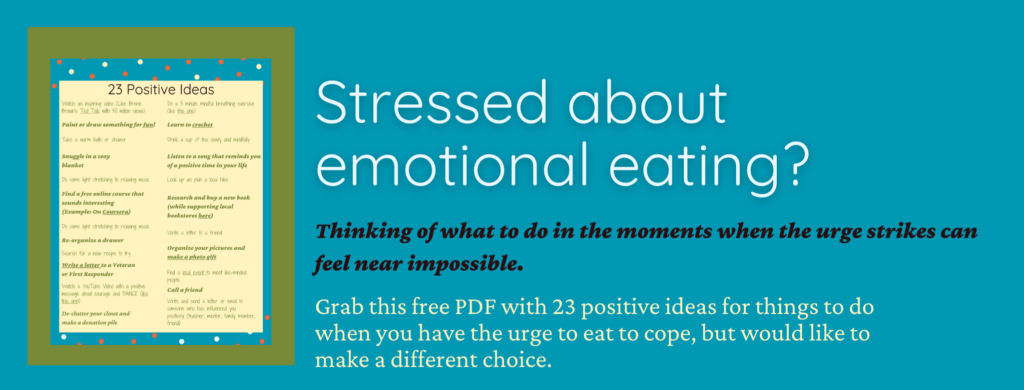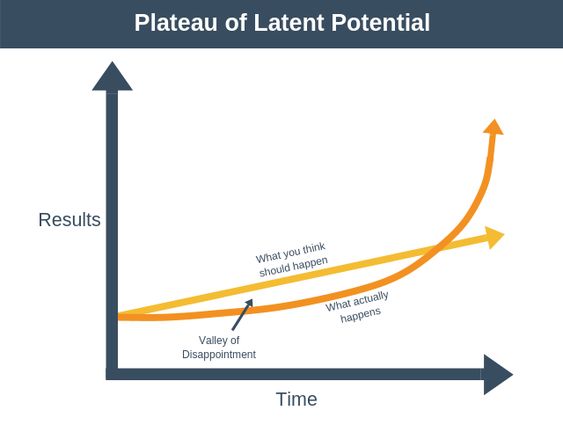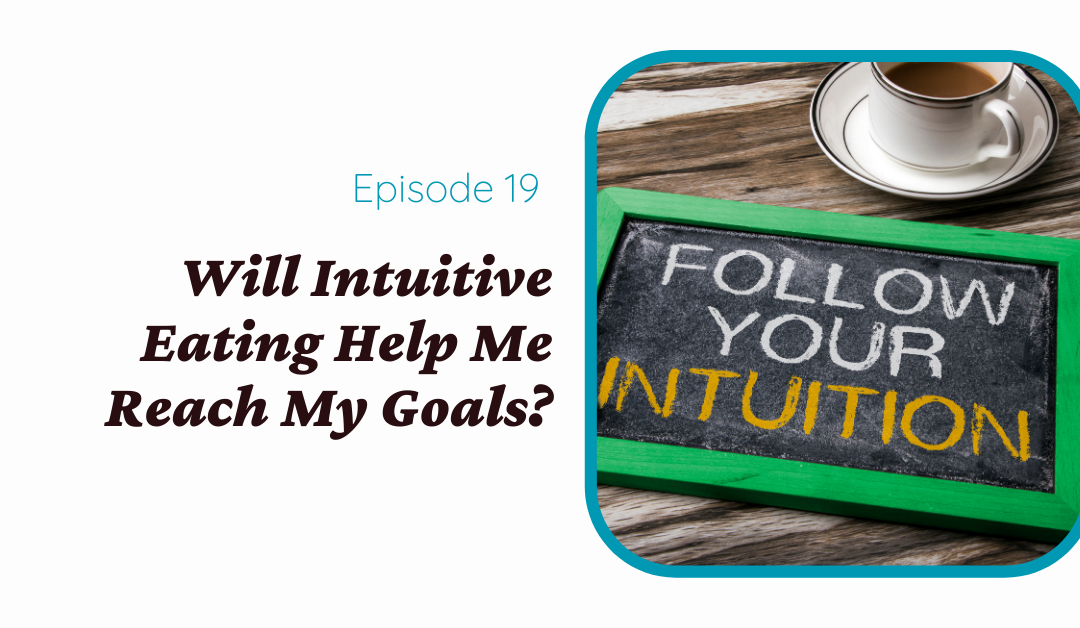Podcast: Play in new window | Download
Subscribe to The Innovative Therapist Podcast! Apple Podcasts | Spotify | RSS | More
Episode 19. In this 3rd post of the Intuitive Eating series, we bring it all together. We ask and answer the most frequently asked questions I get about Intuitive Eating.
We Will Cover:
- Why isn’t Intuitive Eating talked about more if it’s so helpful?
- Can Intuitive Eating ever lead to weight loss?
- How it’s essential to avoid “towing the line” like I did for years
- How to move towards autonomy and choice
But first, did you grab my free guide yet? In the moments when you have a strong desire to eat to cope with emotions, it can feel almost impossible to do something else. I created this guide for those moments. It lists several different options for things to do instead of eating. It’s all about choice, increasing confidence, and therefore feelings of empowerment. Grab it for free here for quick and simple options right at your fingertips (with links, most 100% free) for those difficult moments.

Why isn’t Intuitive Eating talked about more widely if it’s so helpful?
Intuitive Eating has been around for over 20 years and does have good evidence to support it in terms of improving health, yet is not widely adopted or discussed as an option, particularly in the medical community. Why is this?
Intuitive Eating suggests we need to give up all efforts for intentional weight loss in order to truly get in touch with internal hunger/fullness signals and make peace with food. The reality is, there is a lot of pressure from almost everywhere we look that we need to “get weight off quickly”, and this approach does not and will not promise that.
Additionally, many health professionals still believe that weight loss is the best way to improve health (aka, based on the weight-centric model) and therefore want to offer an approach (like portion control, calorie counting, reducing intake) that is more likely to result in “results” (typically, weight loss).
Do I have to give up on weight loss completely if I pursue an Intuitive Eating approach? Or can I benefit from Intuitive Eating principles while still wanting to lose weight?
This is the million dollar question, and an incredibly tricky one to answer.
In general, while actively pursuing an Intuitive Eating approach and focusing on healing a very strained relationship with food (this is common among longstanding chronic dieters or someone with an eating disorder history) it is very often (if not always) incompatible with actively trying to lose weight.
That is, if you are frequently checking your weight and/or actively restricting what you are eating (eating less intentionally, avoiding foods intentionally) this will almost always undermine the process of re-learning to trust your body again.
That said, I think there are still benefits to many of the principles on their own, but focusing on part and not the whole picture could leave you feeling like you are spinning your wheels a bit.
It’s essential to be honest with yourself about WHY you are making the choices you are making, and that can help you uncover whether desire for weight loss is undermining your ability to make a given choice.
Can Intuitive Eating ever lead to weight loss?
I think a lot of people are hesitant to answer this question, rightfully so. They don’t want to trigger people towards more disorder and/or undermine people’s ability to achieve an improved relationship with food because they are still secretly (or not so secretly) hoping for weight loss.
However, I believe in informed choice which means explaining what I’ve seen occur in the research and then with individuals.
I have seen people lose weight after they’ve developed a more intuitive relationship with food and/or followed the Intuitive Eating model. This isn’t guaranteed, and I personally haven’t seen it occur quickly.
The thing I see people do most often (and I myself did for many years) is try to get more in touch with internal signals while also trying to lose weight. I don’t believe this is impossible to do, but I believe it’s very tricky.
I like many, found that I only truly felt free of binge eating when I truly stopped trying to control my weight. I did gradually lose weight years later and I feel healthier than ever, but it was definitely not effortful at all. It’s hard to capture how much the role of stress played in my transformation, but I imagine that not stressing about calories or weight (which is the most freeing feeling in the world, btw) has a significant impact on my health over time.
Be Careful of Towing the Line
If you are going to take an Intuitive Eating approach, it’s important to be honest with yourself about your intentions and goals. As I said, I towed the line for years of trying to become more in tune with my hunger and fullness while also making “lifestyle changes” but really, I was still dieting. That is, I was still turning to external guides to tell me what my body needed, and I was still aiming for a calorie amount (like 1200-1800 calories per day) which was setting me up for binge eating.
Only once I read Intuitive Eating and finally was like ok, I’m going for it, and I’m going to stop worrying about my darn weight, did I achieve peace with food and control over my eating.
You Are In It for the Long Game
I know this isn’t the most exciting thing to hear (who doesn’t like the promise of quick results!?), but I’m here to be honest with you, not sugar coat things.
Improving our relationship with food and our bodies often takes work and time. But not ineffective work like diet-culture tells us. Not the “no pain no gain” approach.
It takes working smarter, and consistently, towards listening to our bodies, respecting them and learning to trust and take great care of them again.
I’ve been referencing this graph often lately. This is from James Clear’s book Atomic Habits on the Power of Latent Potential.

When we put in consistent action over time, we of course want to see “results.” Often we look to weight loss, but any type of results are good to see.
I think one thing that is helpful is to re-define what we think of as results. Like, with an Intuitive Eating approach, if you are fueling your body regularly, you will likely see a reduction in binge eating and/or emotional eating. That’s a nice result. Or you may notice you are more focused and engaged in other aspects of your life when you aren’t so obsessed with foods an your body.
These results are less measurable, but so incredibly important.
The Most Important Things to Know
Whether you follow the Intuitive Eating approach or not, here are the main takeaways that I’ve seen be most useful in myself and others:
1. Rome wasn’t built in a day.
Consistent active and continual improvement over time is what gets us to our goals. Overnight success is a myth, and usually preceded by a lot of consistent work and action. Look at areas of your life where you have seen success… did it happen overnight? Diet-culture tells us weight loss should be instant, and we are desperate for that feeling of relief that weight loss programs promise us. That’s 100% normal, and yet, so many people I’ve worked with find that either the programs don’t work long-term and/or they actually aren’t that much happier when they are at a lower weight.
2. You are so much more than your weight.
I know this is hard to wrap your head around. Our culture is incredibly cruel and judgmental about weight and body size. And yet, you deserve love, acceptance, and good things now, regardless of what your weight does. You deserve to live your life now, and not wait until… you are worth it and engaging in the world from a place of worthiness is a great idea for you and everyone around you.
3. Move towards autonomy regardless.
Autonomy means freedom of choice without excessive pressure. We can give ourselves this by saying “Ok self, you have a choice, you can keep focusing on weight loss or you can try a new approach, what option do you want.” And you want to work to truly not pressure yourself either way. Finding health professionals who support your autonomy as well is also key. They should give you informed choice and all pros and cons, but you are in the driver’s seat to determine the course of action that works best for you.
4. This is personal and nuanced.
Like anything related to health, eating and weight, this is personal and nuanced. I think Intuitive Eating and mindful eating are great, AND, they may not be the perfect fit for you and your body right now. You are the expect on you, even if it does not feel like it. Even if you have lost trust in yourself. You can regain that trust. Intuitive Eating may help, but regardless of the approach you choose, try to view each step as a learning experience. And please make sure you ask for support along the way.
More Examples of Autonomous Motivation
Want more examples of what I mean by autonomous motivation. See examples below.
The first is types of motivation for the behavior of eating a salad for lunch. The motivation types in the red circle are external, the types in the green circle are internal.

And just in case you think I’m saying you should have a salad for lunch, I promise I’m not. Pressuring people to do anything is unhelpful. So just as one more example, let’s look at one more example with another behavior of “choosing not to plan your meals on a given week” and potential reasons for this.

Autonomy is Key
Again, Intuitive Eating and Mindful Eating are great, and certainly offer an option to move many people towards autonomy. Either way, I know you can move away from shoulds and towards autonomy for your health and I’m excited for you because the freedom and joy there is really incredible and you deserve that.
Did you grab your freebie yet?
To increase feelings of competence that we can handle our emotions without food, we often need options. Grab my free PDF guide with 23 positive ideas for things to do in those moments when you are wanting to grab a snack but you really would feel best if you did something else.

Disclaimer: This blog and podcast is for informational and educational purposes only. It is not a substitute for individual professional advice or treatment, including medical or mental health advice. It does not constitute a provider patient relationship.

Shawn, I recently found some videos by Dr. Christiane Northrup that parallel many of your concepts. Such as body intuitive behavior (including eating), and discussions of the diet mentality (weight gain), and stress management for hormonal balance (cortisol). Are you familiar with her work?
Regardless, thank you for your continued presentations on your blog/podcast. I think that some of this is starting to sink in to my head and heart. Now, just need to be properly motivated to get my physical behavior(s) to match.
That name is familiar but I will have to check her out in more depth! I think gradually we are seeing a shift in the field, which is refreshing. You are so welcome. I’m so glad it’s starting to sink in and you are continuing to find it helpful! 🙂